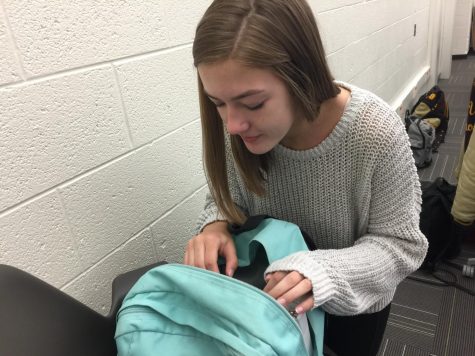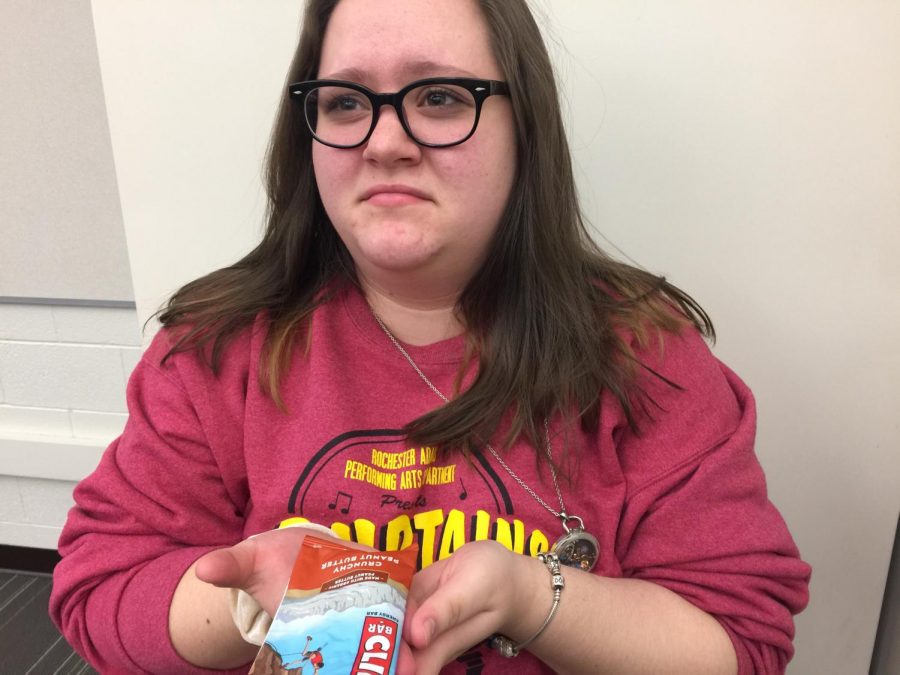Starving For An Education
Junior Kelly Whitehouse holding some food she had for the day.
It is finally spring and that means two things for students: Summer is just around the corner, and so is graduation. With the school year coming to a close, seniors at Adams and high schools all over the country are about to attend the colleges that they choose carefully. While “senioritis” creeping up on these eager students, many do not realize the struggles they may face once they pack up and leave home in August for college.
College students across the states struggle with “food insecurity”, or the reduced quality of diet and lack of nutrition. Many come from low-income families who do not have the money to buy food, or cannot afford to buy food due to all of their educational and housing needs. Young adults going to bed hungry is becoming a national problem. In a study conducted by Inside Higher Ed., an estimated 13 percent of students suffer from food insecurity.
Food insecurity is more prominent during economic downturns, such as the crash of 2008, but from there the number of students going hungry slowly rose back to 21 percent by 2014, and the numbers are continuing to rise today. One of the main reasons students did not have access to much food was the lack of money and the heavy expenses they were expected to pay on their own.
“Unfortunately, you’ve got so many people locked into expenses. You have to pay a certain amount on rent — you can’t cut back on rent — so one of the only things you’ve got that is flexible is food, and that’s not a great place to cut back,” said professor Diane Schanzenbach from Northwestern University.

Junior Caitlin Martens looking through her backpack for some food.
This problem is not rooted from the lack of work either. In a survey conducted by Students Against Hunger (a website dedicated to this cause specifically) an estimated 56 percent of food-insecure students have paying jobs, and of that statistic, 38 percent work 20 or more hours a week. Without a major necessity such as food, students are struggling to continue to go on with their education each day. Reports can conclude that some students will not buy the necessary textbooks, or even attend class if they are struggling with money or do not have access to proper meals.
Many schools have tried to help these students by providing them with meal plans and financial aid in order to ease the weight of the stress they are carrying. These meals and extra support can only do so much for these poor souls, even with the care they are receiving these adolescents still suffer from food insecurity.
“I think [food insecurity] is a major problem that qualified students who earned their education has to deal with. Campuses should be required to provide adequate aid to students who cannot pay for food,” said junior Izzy Conti.
Despite the negative news being presented, there is still hope. This is a national issue that needs to be addressed, and there are steps that can be taken to prevent this issue.
With websites like Students Against Hunger, the situation is finally making its way into the media. Local and state lawmakers are looking for a solution to this ever-growing problem.
There has to be more that the government could do to prevent students from sacrificing their mental and physical health, and even their education. If they were shown the proper support that they deserve, this problem could slowly be eliminated. Teens and young adults have worked hard and fought through many hardships to get to the place they are at. Students should be worrying about exams and getting to their classes on time, not whether they will be able to have dinner that evening or not.










